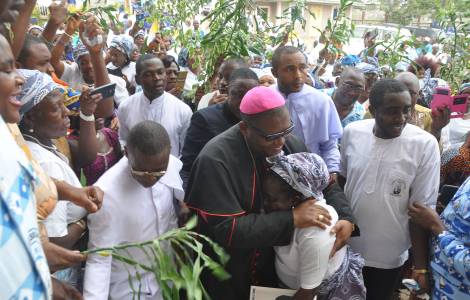
Buea (Agenzia Fides) - "In Cameroon we have 26 dioceses and the missionary work of the Church is in the hands of the Lord, of the college of Bishops, of missionaries, of all the baptized. The Bishops drew up the general strategies for the mission, adaptable in the dioceses according to the different realities of our Country. Our Church has been supported for centuries by missionaries who came from abroad, mostly from Europe. Now, however, the Church in Cameroon is taking on an increasingly local face. We have many young people who come from all areas of our Country and we can say with gratitude that there are many vocations in Cameroon. We have achieved our independence at a pastoral level, but we continue to have a stable point of reference in many missionary congregations". Father Cletus Ashu Amah, recently appointed National Director of the Pontifical Mission Societies (PMS) in Cameroon (see Fides, 11/5/2022), reports this in an interview with Fides in Buea, the second most important city in the Anglophone regions of Cameroon. The National Director takes stock of the situation and activities of a very lively Church in constant missionary enthusiasm.
"The religious congregations that originally came from abroad - he recalls - are diminishing a lot compared to the beginning, some have left the Country. The missionaries came, they gave us their faith and their positive influence is still alive: they are points of reference for the local clergy as regards missionary work. The legacy they have left can also be seen in the formation of local religious congregations, realities that are emerging with increasing frequency. The majority of religious or consecrated persons from congregations who have come from abroad are now local people. There is a continuity with the old missionaries, whose work is now being carried out by local religious".
The Church, says Father Cletus, works to create peace and reconciliation in the English-speaking regions of Cameroon, where the population is caught between war and isolation: "The mission of the Church in the English-speaking regions is very different from other areas and is greatly affected by the terrible crisis in place. It is an enormous difficulty for the whole Church. I come from Bamenda (the capital of the English-speaking regions, center of the conflict, ed) and I can say that I myself have experienced, several times, what it means to be a Catholic priest in that region. I have often been blocked in my travels by armed separatists or members of the army and threatened. This happens frequently, not only in remote areas or forests, but also in the center of Bamenda or other cities in the English-speaking regions. When we have to reach the peripheral parts of the dioceses for pastoral reasons, the task presents numerous difficulties, and each activity to be planned requires much more effort than any other area. The Bishops of that region drew up a specific missionary plan for the area, even before the crisis broke out (in 2017 ed.)".
On missionary work, the National Director of the PMS says: "The formation of Christians begins with what we call the 'Church of proximity', that is, small communities scattered across the territory, which become missionaries. The baptized go from house to house, even without the presence of priests, to announce and bear witness to the Christian faith among the people. This is now crucial because in some areas, priests are unable to arrive. Months can go by without any priest being able to gain access to some areas and those who do do so after negotiating the passage with both the military and the Amba Boys (the armed separatists, ed.). We are comforted to know that the people also gather in prayer and share the Word of God".
The vocation to peace is very present: "In the individual dioceses, not just the Anglophone ones, we try to bring forward the message of peace for the Country. We want to guide people's hearts towards peace, a gift of Christ Jesus. For us this is the priority, it is a message that bishops and priests place at the center of their preaching. I think it is very important that Msgr. Nkea, Archbishop of Bamenda, has become president of the Episcopal Conference. He is the first Anglophone Bishop titular of an Anglophone See to become President of the Episcopal Conference, and this puts an end to those fears that occasionally circulated that the Francophone Church was pre-eminent in Cameroon. In the Conference, now, the Secretary General is English-speaking and of the 20 priests on permanent service, five are English-speaking. I am convinced that the presence and work of Msgr. Nkea will be able to make a strong contribution in the search for peace". (LA) (Agenzia Fides, 13/7/2022)